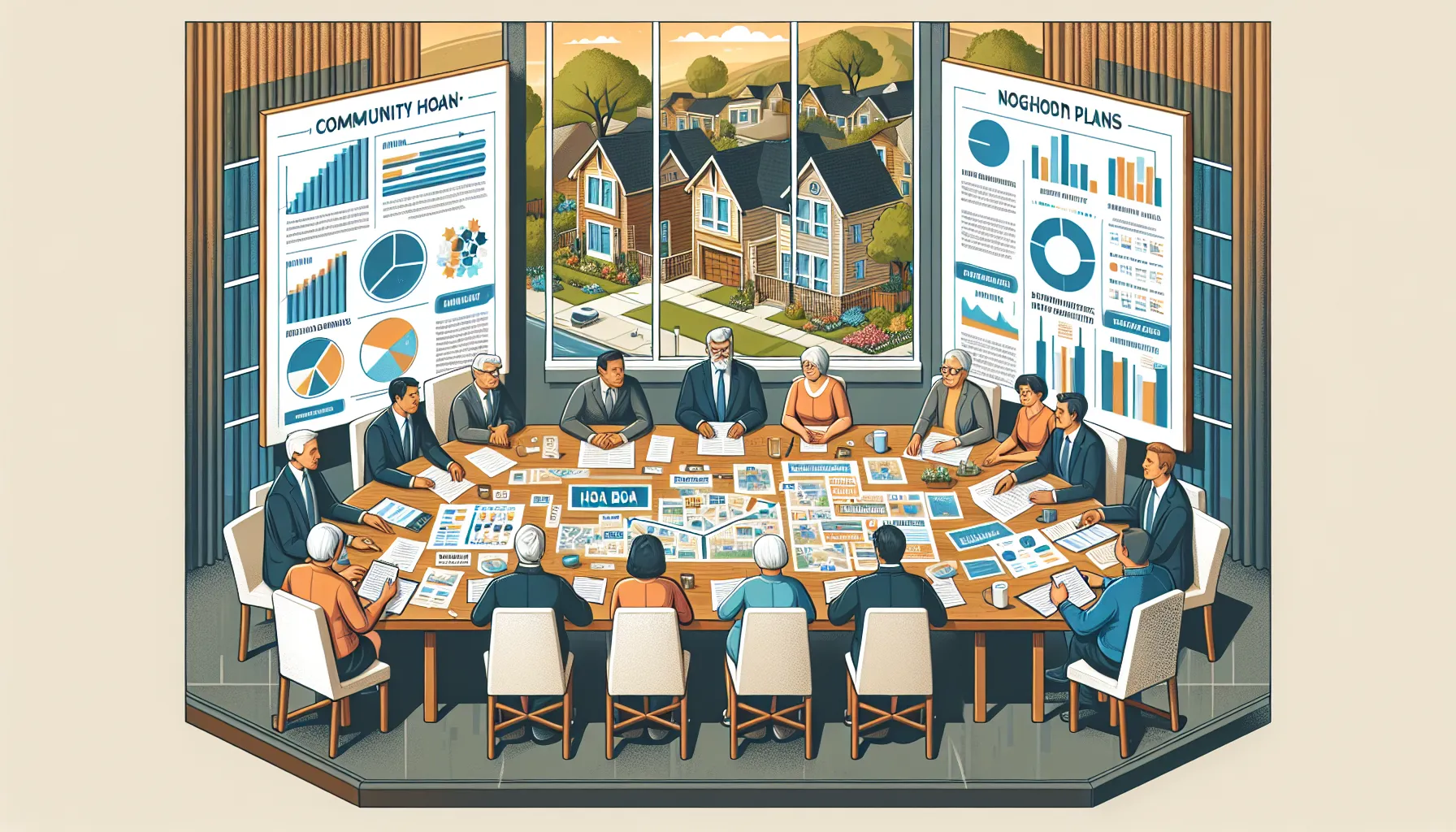Key Takeaways
- Effective HOA planning support in Pleasant Hill streamlines financial management, property maintenance, and community communication for smoother operations.
- Professional guidance helps boards create structured plans, set realistic goals, and reduce stress by breaking down complex responsibilities into manageable steps.
- Transparent communication and consistent updates foster trust, minimize misunderstandings, and increase resident engagement.
- Reliable maintenance scheduling and careful budgeting protect property values and prevent unexpected expenses.
- Choosing experienced service providers with proven expertise ensures boards receive tailored support and valuable local insights.
- Adopting best practices like routine budget reviews, goal setting, and proactive conflict resolution leads to a more stable, harmonious community.
Managing an HOA in Pleasant Hill can feel overwhelming, especially when every decision impacts your community’s well-being. I know how important it is to balance budgets, address maintenance, and keep everyone on the same page. Have you ever wondered if there’s a better way to make these tasks less stressful?
Many boards struggle with planning—from setting realistic goals to handling unexpected challenges. You might be searching for guidance that makes the process smoother and more transparent. What if you had support that truly understood your community’s needs and helped you create a plan everyone could stand behind? Let’s explore how thoughtful planning can make HOA management in Pleasant Hill a more positive experience for everyone involved.
Understanding HOA Planning Support in Pleasant Hill
HOA planning support in Pleasant Hill focuses on helping board members handle day-to-day responsibilities and longer-term strategy. I recognize how board leaders often feel overwhelmed by financial oversight, property maintenance, and neighbor communications—sometimes all at once. Have you ever wished for experienced advice on budgeting or preparing for major repairs?
Professional planning support breaks these tasks down into manageable steps. Financial managers assist with budget reviews, offer direction on setting reserves, and help track monthly expenses. Maintenance coordinators set up inspection schedules, connect you with reliable vendors, and advise on seasonal upkeep projects. Communication experts provide ways to keep residents updated—whether through digital newsletters or regular open meetings.
Every HOA board has a different mix of personalities and priorities. Do you find it challenging to balance fair rules with friendly neighbor relations? Planning support offers structured approaches for board meetings, dispute resolution, and policy updates so discussions stay on track. This helps promote positive interactions and clearer expectations for everyone.
I know that strong planning leads to better decision-making and smoother community operations. Have you identified any specific issues that slow your board’s progress? With knowledgeable support, boards spend less time reacting to problems and more time building community stability.
Key Benefits of Effective HOA Planning

Clear planning sets the stage for an organized community. I notice board members often feel unsure about what comes next. When every step has a purpose, everyone moves forward together. Have you ever wondered how a simple structure reduces confusion and stress?
Careful financial planning helps prevent shortfalls. Tracking expenses and income becomes easier with systems in place. Well-done planning avoids surprises like sudden repairs or unexpected fees. Wouldn’t you prefer knowing exactly where the HOA budget stands month to month?
Reliable maintenance schedules improve property values. Regular reviews help prevent large, costly repairs. Consistent upkeep shows residents that their investment matters. How would you feel if every property looked its best year-round?
Open lines of communication lead to fewer misunderstandings. I see smoother board meetings when clear agendas and updates exist. Residents appreciate knowing what’s happening and why. Isn’t it better when everyone feels informed and heard?
Conflict resolution strategies foster a healthier community environment. Steps for voicing and handling disagreements keep tension low. Disputes settle faster when protocols exist, and relationships remain constructive. How could your board benefit from a calm, respectful approach to disagreements?
Long-term planning adds stability for everyone involved. Planning several years ahead protects the community from large, sudden shifts. Everyone feels more secure when there’s a vision and steps in place to reach it. Have you noticed how much easier it is to make confident decisions when the future feels mapped out?
Essential Services for HOAs in Pleasant Hill

I know how much work goes into running a successful HOA in Pleasant Hill. Every board wants smooth meetings, stable finances and a welcoming community vibe. Have you wondered which services really make a difference for your HOA’s planning and progress? Here’s how strong support can help you lead with clarity and confidence.
Strategic Planning and Visioning
Clear planning sets the direction for everything an HOA does. I support boards by helping set priorities—whether that’s improving amenities, long-term reserve funding or updating association rules. Goal-setting sessions spark productive conversations and bring diverse board perspectives together. What changes would you most like to see over the next few years? I make these plans actionable, so your vision moves from discussion into reality.
Budgeting and Financial Management
Sound finances keep an HOA strong. I help boards review past spending, prepare precise annual budgets and forecast future needs. This includes evaluating vendor contracts, tracking all income and expenses, and preparing financial reports you can trust. Are there areas in your budget that always seem to stretch resources? I break down the numbers so boards feel secure, even when planning for large projects or building up reserves. Transparent financials let everyone see how funds support the community.
Community Engagement and Communication
Open communication brings neighbors together. I guide boards in sharing updates consistently, collecting community feedback and responding to member concerns. Simple tools like email newsletters, surveys or owner forums open up dialogue. Do you find members sometimes feel out of the loop? My approach helps prevent misunderstandings and builds trust, so everyone feels informed and included. When residents feel heard, participation grows and the neighborhood spirit gets even stronger.
Choosing the Right HOA Planning Support Provider

Finding help with HOA planning in Pleasant Hill starts with knowing what matters most for your board and community. I understand how much you want a smooth experience, less stress, and results you can trust.
What to Look for in a Service Partner
Experience with similar-sized HOAs helps a provider handle challenges familiar to your board. Proven track records in budget management, property maintenance, and conflict resolution offer valuable peace of mind. Responsive communication stands out—quick replies and regular updates keep you in the loop. Transparent pricing matters too, with clear breakdowns of fees so you always know what you’re paying for. Service flexibility is important, whether you need only financial oversight or want someone who also handles maintenance, reporting, and resident engagement. Established systems for reporting, project tracking, and compliance save your board time and headaches.
Questions to Ask Before Hiring
How do you support new board members or those with less experience? Asking this identifies whether they’ll make your role easier or leave you figuring things out alone. What’s your process for resolving disputes or complaints? Clear answers can set expectations around common HOA situations. How often do you communicate with the board and residents? Consistent communication keeps everyone updated and reduces confusion. Can you provide references from Pleasant Hill or similar local communities? Local experience often means fewer surprises.
How would your team approach budget shortfalls, maintenance emergencies, or long-term planning? Open-ended questions reveal how a provider responds to pressure and adapts to community needs. What tools or software do you use for management? Up-to-date tools smooth operations and simplify reporting. Do you offer support for annual meetings, elections, or legal compliance? The more complete the support, the less you worry about missed details.
Are there additional services you can add or remove if the board’s needs change? Flexibility helps your HOA adjust as priorities shift. What else do you wish every board knew before hiring a planning partner? Invite any insights they’ve learned from experience.
What feels most important to you in a planning partner—strong communication, local expertise, issue resolution, or something else? By sharing your priorities, you help your provider understand how best to support your HOA, now and into the future.
Common Challenges HOAs Face in Pleasant Hill

Managing an HOA in Pleasant Hill brings a variety of ongoing challenges for board members and residents alike. Many board members ask, “How do we keep our community running smoothly when there are so many moving parts?” If you’ve ever wondered why certain hurdles keep appearing, you’re not alone.
Budgeting Struggles
Staying on track with budgets presents a frequent challenge for HOAs in Pleasant Hill. Boards often juggle fluctuating costs for landscaping, repairs, and utilities. Misestimating annual expenses can cause stress when funds run short, leaving everyone frustrated. Do you ever worry about covering unexpected repair costs or keeping assessments stable?
Property Maintenance
Coordinating repairs and routine upkeep requires time and organization. Delayed maintenance, like untrimmed trees or pool issues, leads to resident concerns about property values and community appearance. Many HOAs wish they had a simpler way to schedule tasks and respond to urgent needs. What’s your approach to keeping common areas well maintained?
Resident Communication
Clear updates and transparent decisions ease confusion and reduce complaints. In Pleasant Hill, boards sometimes struggle to find the best ways to reach busy neighbors. When important details don’t reach every resident, misunderstandings and frustration follow. Have you found communication methods that keep everyone informed and engaged?
Enforcing Community Rules
Maintaining consistent standards is tricky, especially in vibrant neighborhoods. Boards balance fairness with flexibility, aiming to treat all residents equally while handling parking, noise, or landscaping violations. Selective enforcement erodes trust, and many communities search for systems that promote transparency and respect.
Handling Disputes
Disagreements among neighbors or between residents and the board are common. Without a plan for resolving conflicts, tensions can escalate. Many board members wish for clear procedures to keep emotions in check and resolutions fair. How does your HOA resolve disagreements when opinions differ?
Long-Term Planning Uncertainty
Predicting what a community will need next year, let alone five years from now, is a challenge that many boards face. Future concerns—like rising construction costs or shifting resident needs—add pressure to make careful decisions today. Do you have strategies in place for keeping your HOA prepared for what’s ahead?
Recognizing shared challenges helps everyone feel supported and better equipped to address them. What’s the most urgent problem your HOA currently faces?
Best Practices for Successful HOA Planning

Active planning gives HOA boards more confidence, stability, and clear direction. I’ve found several practical strategies that work across Pleasant Hill communities. Which of these have you tried, and where do you see room for growth in your own HOA?
1. Maintain Transparent Communication
Open communication builds trust with residents and board members. I recommend regular updates through emails, newsletters, or open forums. These tools make it easier for everyone to stay informed about decisions and upcoming projects.
2. Schedule Routine Budget Reviews
Consistent financial reviews help prevent surprises and improve long-term financial health. I’ve noticed boards benefit from quarterly meetings to reassess expenditures and plan for upcoming costs. How often does your HOA check on its budget?
3. Establish Clear Maintenance Calendars
Predictable maintenance keeps properties attractive and prevents expensive repairs. Shared online calendars or printed schedules posted in common spaces can help everyone keep track of key dates like landscaping, inspections, or amenity repairs.
4. Set Realistic, Achievable Goals
Breaking long-term projects into smaller, defined steps keeps the board focused and motivated. Asking questions like, “What can we complete this quarter?” makes it easier to measure progress and celebrate wins.
5. Encourage Constructive Feedback
Inviting ideas and concerns from residents lets the board address issues early. Anonymous surveys or suggestion boxes create space for honest input. How do homeowners in your community usually share their thoughts?
6. Resolve Disputes Quickly and Fairly
Clear processes for handling disagreements lead to fewer disruptions. Designating a committee or using impartial mediators helps maintain a positive community feel.
7. Prioritize Training and Education
Staying informed with the latest property management best practices benefits everyone. Workshops, online courses, or guest speakers can help board members build the skills they need.
Each step pushes your HOA closer to a more organized, engaged, and impactful community. What strategies have helped your board make the biggest strides?
Conclusion
I’ve seen firsthand how the right planning support can transform HOA management in Pleasant Hill. When boards have the resources and guidance they need it’s easier to create a thriving community where everyone feels heard and valued.
If you’re ready to take the next step toward a more organized and confident HOA experience don’t hesitate to seek out professional support. You’ll not only lighten your board’s workload but also set your community up for long-term success.
Frequently Asked Questions
What are the main challenges HOAs in Pleasant Hill face?
HOAs in Pleasant Hill commonly struggle with budgeting, property maintenance, communicating with residents, enforcing community rules, resolving disputes, and planning for the long term. These challenges often lead to stress for board members and confusion among residents.
How can effective planning support help HOA boards?
Effective planning support helps HOA boards by breaking large tasks into manageable steps, offering guidance for budgeting, coordinating maintenance, setting clear goals, and establishing better communication. This structured approach reduces confusion and leads to better outcomes for the community.
What are the benefits of strategic planning for an HOA?
Strategic planning helps HOAs stay organized, set priorities, and achieve long-term goals. It ensures board discussions lead to real improvements, prevents financial surprises, keeps maintenance on schedule, and improves neighbor relations, creating a more stable and harmonious community.
How does financial planning improve HOA management?
Careful financial planning helps prevent budget shortfalls, avoid unexpected expenses, and ensure resources are allocated wisely. It also provides transparency for residents, builds trust, and supports stable property values by funding necessary maintenance and improvements.
Why is open communication important in HOA communities?
Open communication reduces misunderstandings, eases tension during board meetings, and keeps residents informed. Tools like newsletters, surveys, and regular updates help residents stay engaged and involved in community decisions, resulting in a more unified neighborhood.
What services should an HOA look for in a planning support provider?
HOAs should seek providers with experience supporting similar-sized communities, a track record in budget management and dispute resolution, responsive communication, transparent pricing, and flexible service options tailored to the board’s specific needs.
What questions should boards ask potential planning support providers?
Boards should ask about experience with similar HOAs, how they onboard new board members, manage disputes, handle financial emergencies, adapt to changing priorities, and ensure clear, responsive communication throughout their partnership.
How can HOAs improve conflict resolution among board members?
Implementing structured meeting approaches, clear rules for dispute resolution, and training in communication skills can help. Promptly addressing conflicts and fostering a respectful environment reduces tension and leads to more productive board relationships.
What best practices lead to successful HOA planning?
Successful HOA planning relies on transparent communication, regular budget reviews, clear maintenance schedules, realistic goal-setting, encouraging feedback, fair dispute resolution, and providing ongoing training for board members. These practices build confidence and community engagement.
How can residents get more involved in their HOA?
Residents can attend meetings, join committees, participate in surveys, provide input on community improvements, and volunteer for board positions. Active involvement ensures a stronger voice in the community and supports effective HOA management.
